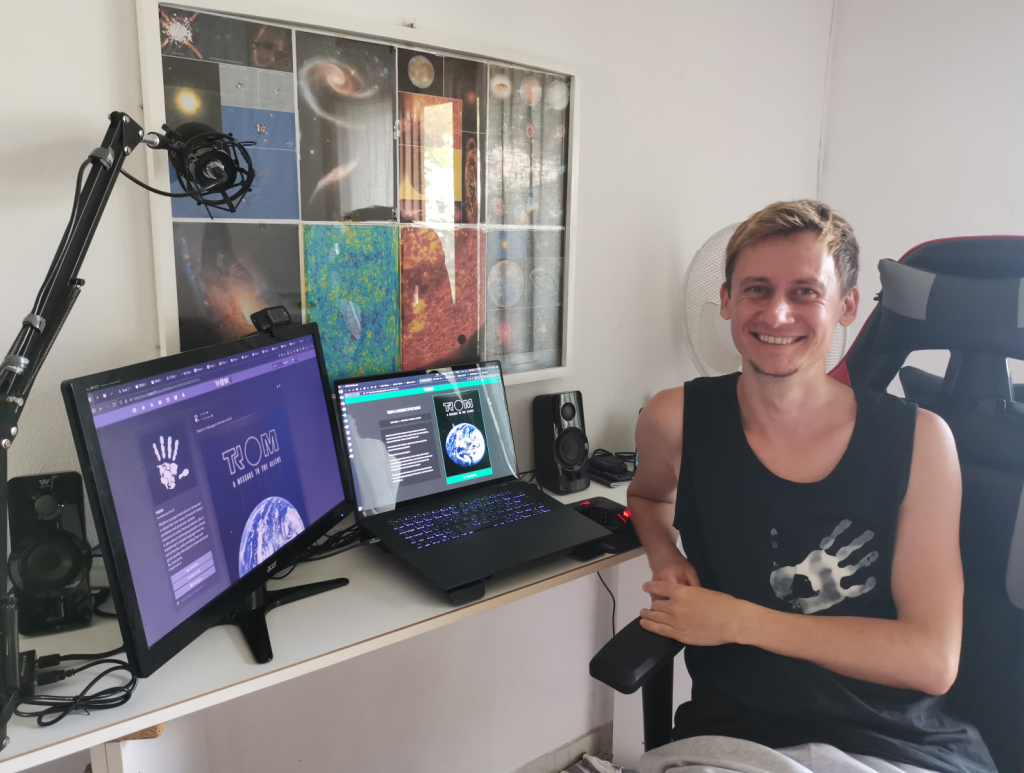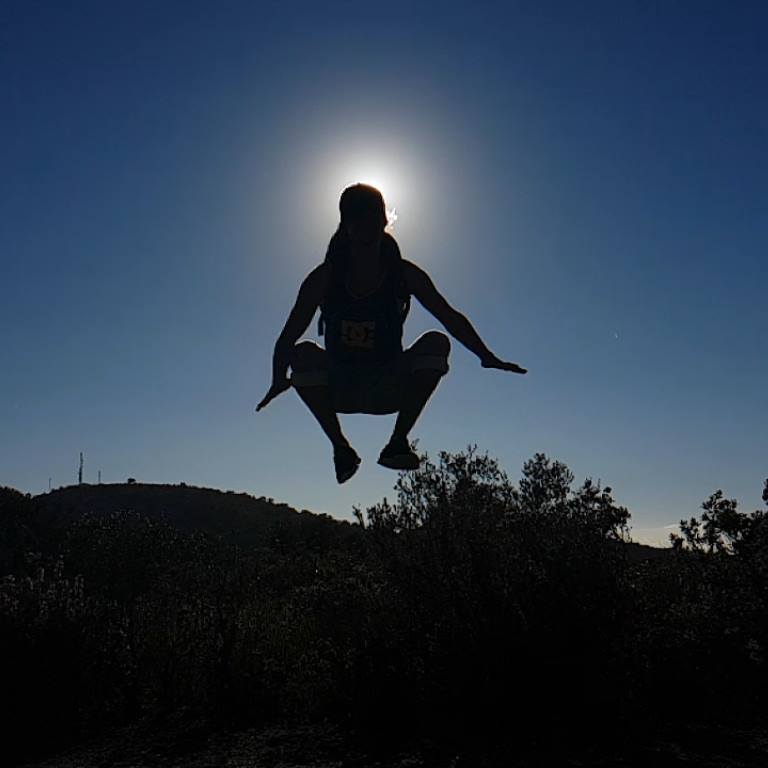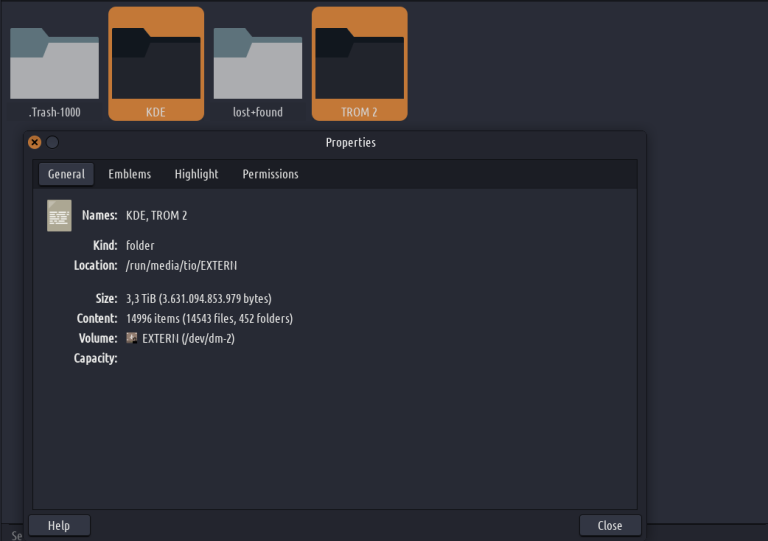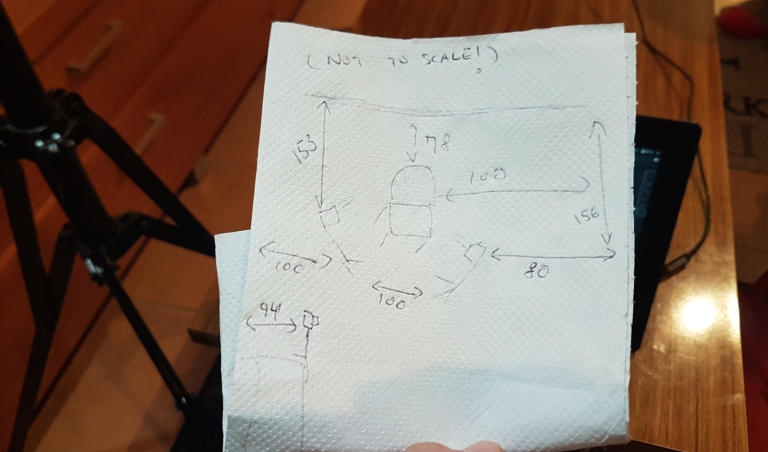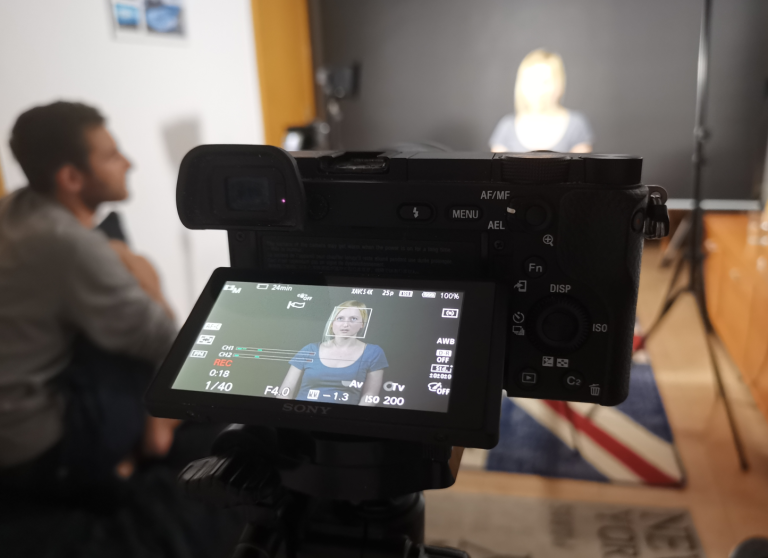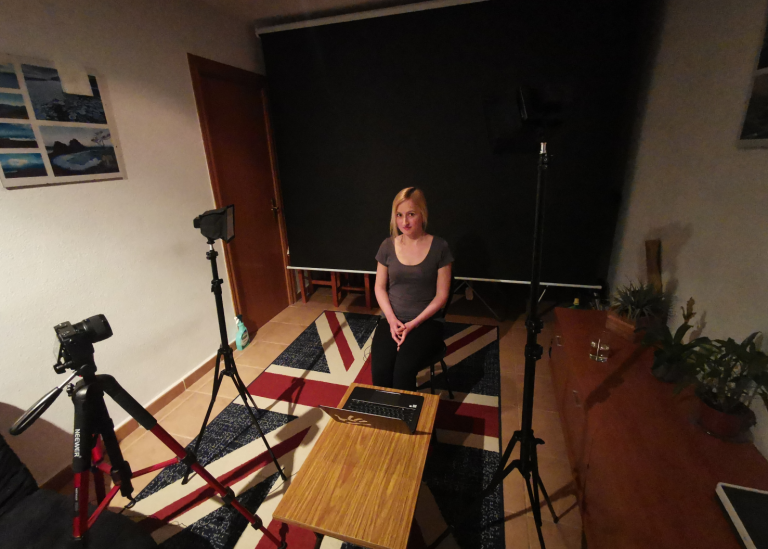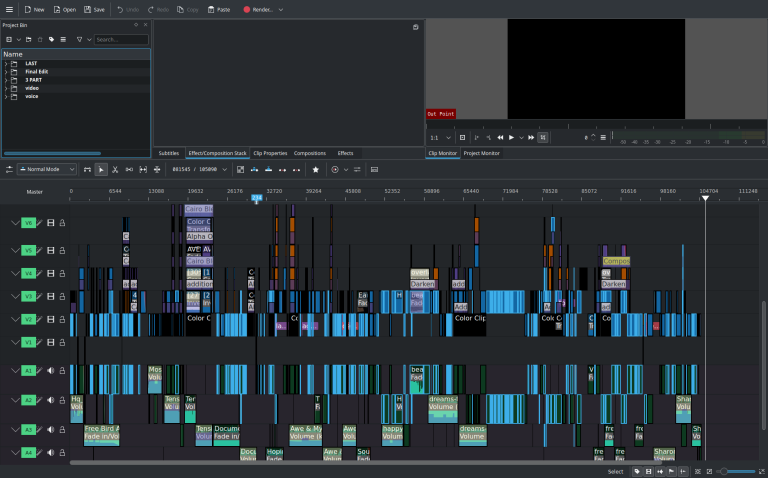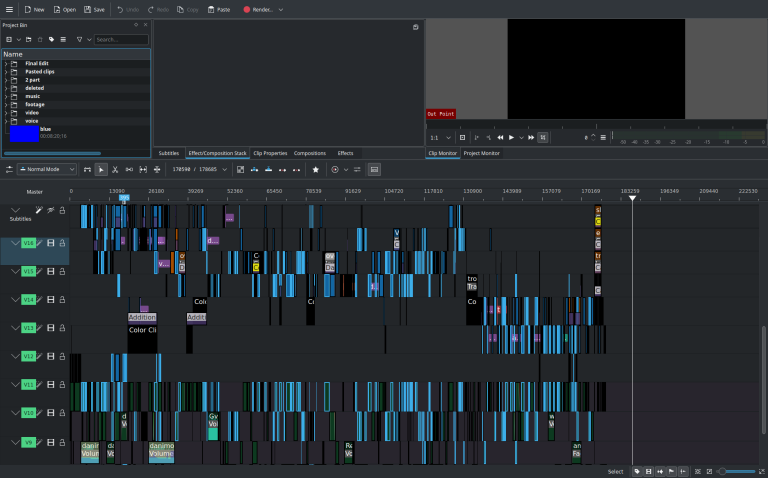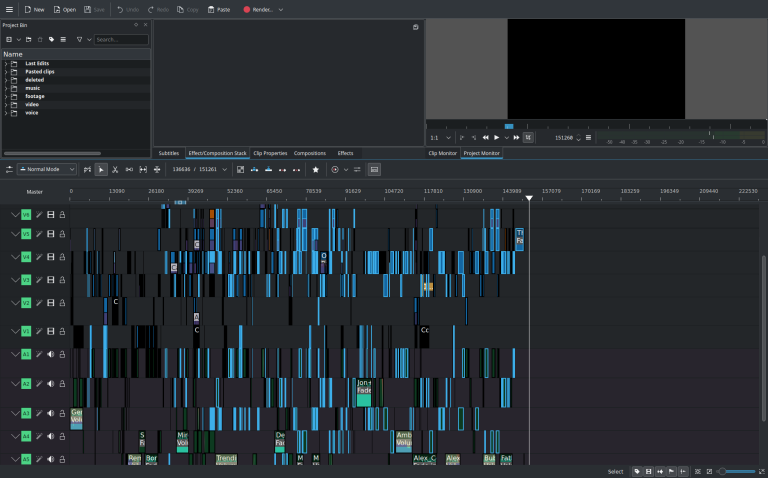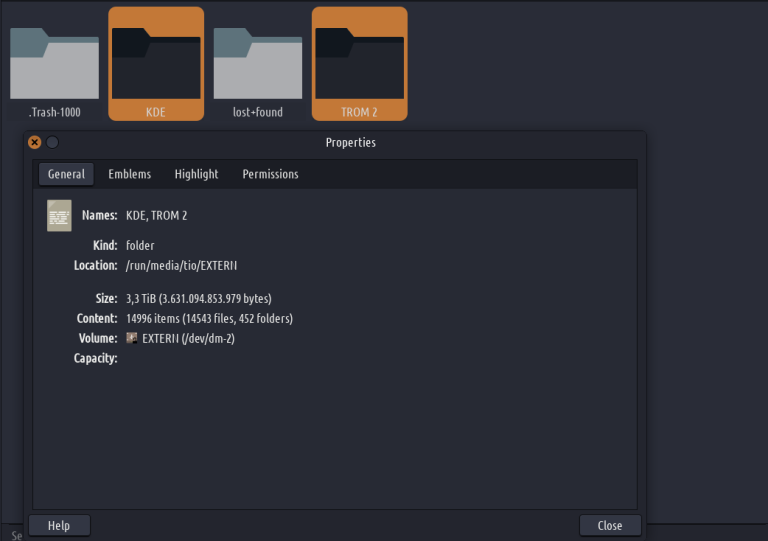
Making TROM II. 3 years in one post.
By tio | | Comments 2 comments
FIRST: In these 3 years I did a lot of other things.
From moving all of our websites to an unmanaged server (and that requires you to become a server admin), to the release of TROM.tf (some 20 trade-free services, including our own social network, video platform, or file hosting) together with moving all of our videos and social presence there; I also managed and improved TROMjaro in this time, even moved form Gnome to XFCE, and learned how to manage our own packages – basically a ton of work. Oh and I had to rebuild VideoNeat a few times, and more stuff probably that I can’t even remember. Lots of TROM-casts, a lot of stress because of the lack of money, plus the work I was doing for WebApe to try to make more money…I was really busy.
Therefore, I was not fully working on this documentary. If I did, I would have done it in one year probably.
What did I want to do with this documentary?
Look, I know what I want to tell to the world. In my mind it is very simple. I can narrow it down to this:
We live in a society that humans have invented. It is based on their imagination: money, social statuses, ownership, prices, stuff, you name it. People imagine these things and the value of them. Shockingly, despite the same humans discovering how the world is (atoms, galaxies, cells, evolution, etc.), their day to day life is basically unchanged for the past thousands of years. The world they invented overwrites the world they have discovered. To me this is not only shocking, but extremely harmful because they chase illusions like money, fame, whateverthefuck, despite destroying themselves and the environment in the process. But there is a pattern in their thousand-years-old invented society that makes them be so destructive, primitive, and hypnotized by their creation. And that is the practice of trade. Trade makes humans be the busy idiots that they are today. And if we are to change anything, we need to understand this, and move away from it, because it is impossible to make a sane and non-destructive society if trade is the main practice in this society.
I wrote many books about this, made videos, and screamed about it for more than a decade now. But I wanted to create something that anyone can sit down and watch, and understand these ideas. Get comfortable with them. Unscripted, raw, genuine.
I wanted to combine the life stories of 5 people (us) with a general overview of this global society of trade. In my view the most powerful way to present something is to give a personal example that people can resonate with, and then expand that example globally. For instance Dima talks about how he was living in squat house for free, and how that was quite great to not worry about money. He then mentions how they were getting the food from garbage bins – the food that was perfectly fine to eat, but supermarkets would throw it away. I then expanded that to show how globally we waste so much food while so many people are starving. Then how many houses are empty through Georgi’s story. Pieces of the puzzle were combined, like a salad made up of personal stories sprinkled with footage and photos from our childhood years, combined with statistics and facts. I think that’s the best approach.
Keep in mind: we had no script, only some notes. We do not read, we talk. From our heads directly. And that makes it a lot more genuine and real.
40 hours trimmed down to 4
There is no way for me to properly explain how hard it was to go through some 40 hours of recorded interviews that had NO script, and create a story that lasts for some 5 hours. How do you even begin!?
Well I had to listen to those 40 hours some 40 times, without exaggeration. I would listen, cut, delete some parts, listen again to make sure it makes sense. Many times I had to cut the uhmm, aaah, hmmm and so forth. TONS of those! It is normal when you have no script. Many times we repeated things. Then we said the same things between all of us. It felt like taking a good and chunky piece of wood and sculpting it like this:
Layer by layer, for some 2 years. I was trimming it down to 20 hours, then 10, then split the many hundreds of little clips into sections to see how I could create the parts for the documentary. I don’t think I had a clue about how long this documentary would be, how many parts, or even how it would end, until like a few months before the release. It was a work in progress all of the time.
Color correction madness
How can you properly record at high quality, 5 humans on a pitch black background? Well, we had a smallish room, a projector “thing” that was black on the other side, some bright lights from Dima, and Dima’s camera that could record in 4K. And a napkin where we took notes of where each “item” is :).
This is the first time I recorded something for a documentary, or long video format. I almost never used a camera except those old ones that had 3 buttons. I never had a need for one. This time we used Dima’s camera that had a ton of options and a huge lens.To figure what settings we should use, was a challenge to say the least.
We could not avoid to cast a shadow on that black background, and while recording we didn’t manage to get a fully black background either. For some was blueish, for some greyish…And because we had some powerful lights (splashing photons into our faces) these faces of ours became washed out. Too bright to see much color in some recordings.
On top of this we recorded a few times with auto settings for the framerate, meaning that we got some framedrops in some recordings that look bad, and you can see that in the first part of the documentary for my recordings. I could not fix them unfortunately.
Not to mention that we recorded over a period of 6 months, a few hours a day, and the days were scattered, plus the camera was overheating so we had to pause every 20 minutes….Therefore we had to redo the settings, lights, then position us relative to everything else, and all that for this period of many months. And so the recordings did not look the same.
Again: 6 months, 4-5 recordings a day, scattered days over that period of time, 40 recorded hours in total. Recordings done, now edit!
Screens are not the same!
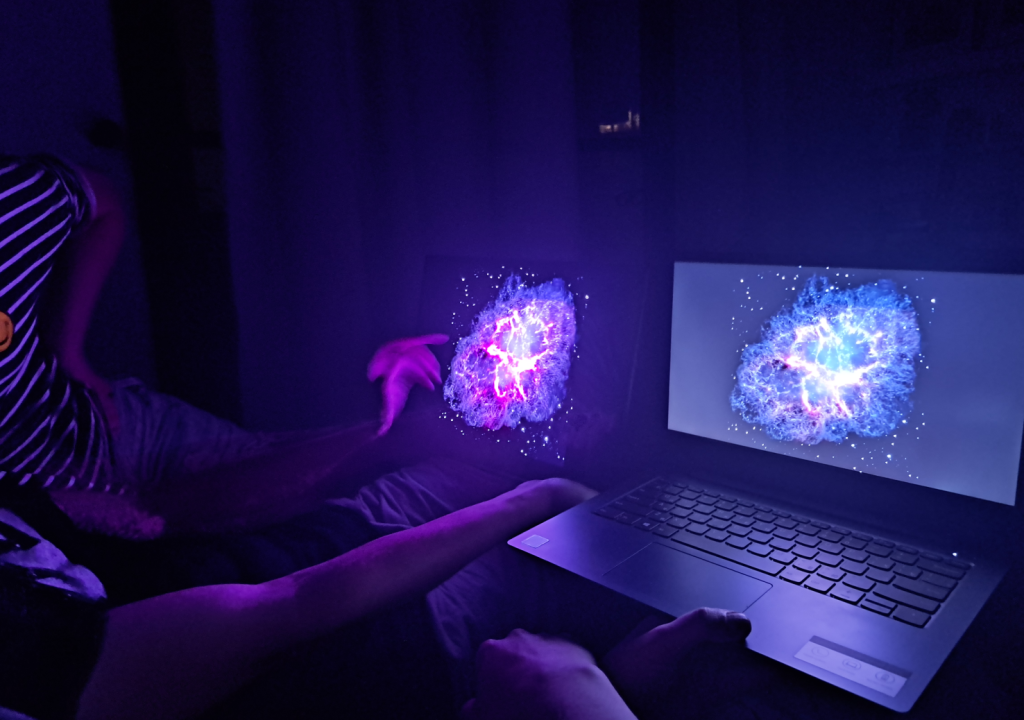
Another thing to consider is that I had a laptop with an LCD screen and I edited 80% of the documentary on that screen. Then I bought a new laptop with an OLED screen (left side), and these screens are far far superior in terms of blacks and colors. Basically most screens (LCD) have some “bulbs” on even when you look at a purely black image. OLED turns off the “bulbs”. If you are in a pitch black room and your laptop is at full brightness displaying a black image in full screen, on an LCD you can clearly see it. On an OLED screen you have no idea where the laptop is. Like you see in the above photo we used the same exact image of a nebula, and on my OLED screen on the left side you cannot see the black, but on the LCD on the right you clearly see that black being washed out.
Not only that but the OLED was a lot more color accurate. See the difference:
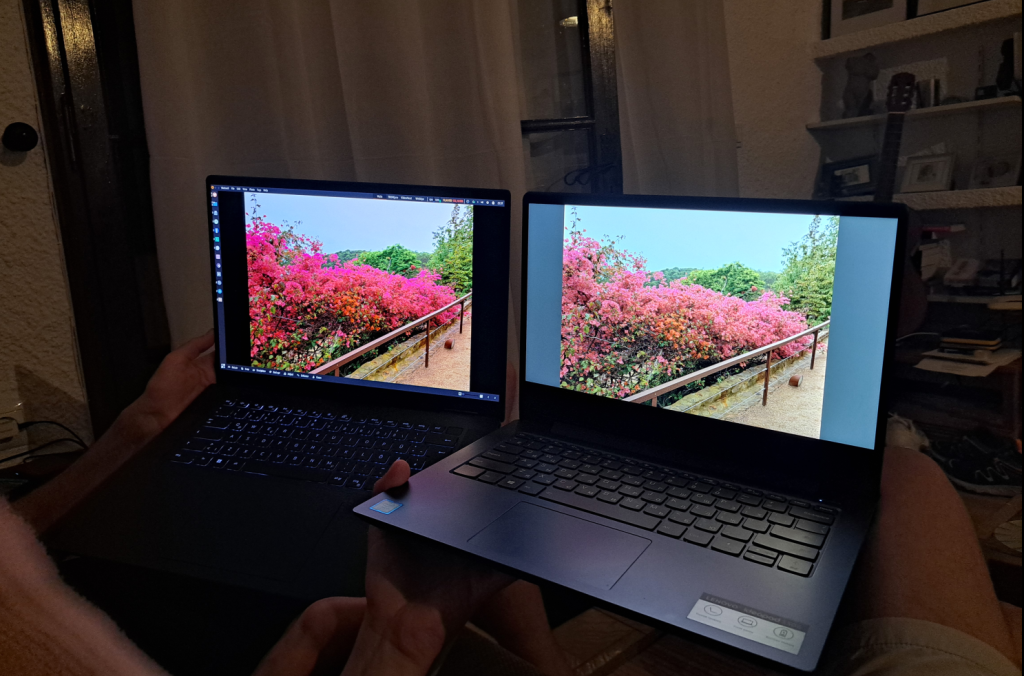
So after doing the color correction for weeks on the LCD, I noticed a lot of artifacts on the OLED so I had to do them again. In total I spent many weeks only on the color correcting and re-correcting. So I made sure that the documentary looks great on both OLED and LCD screens.
This is the original vs the color corrected footage:
As you can see Georgi had a white t-shirt and that made it a lot more difficult because if I were to lower that brightness down then her face would become very dark. I had to add some curves and a lot more effects. I wanted all of the recordings to look like one.
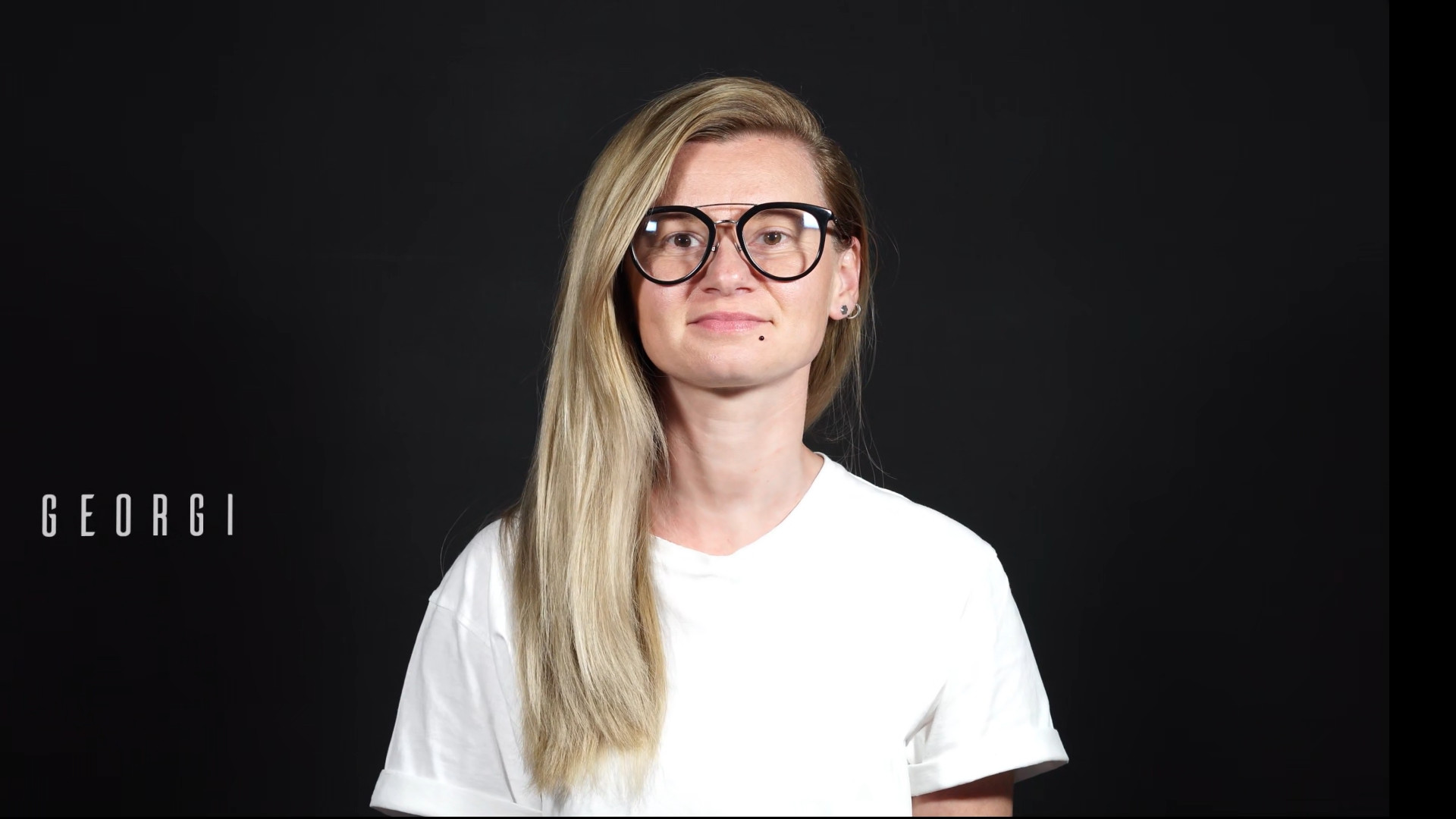 BEFORE
BEFORE
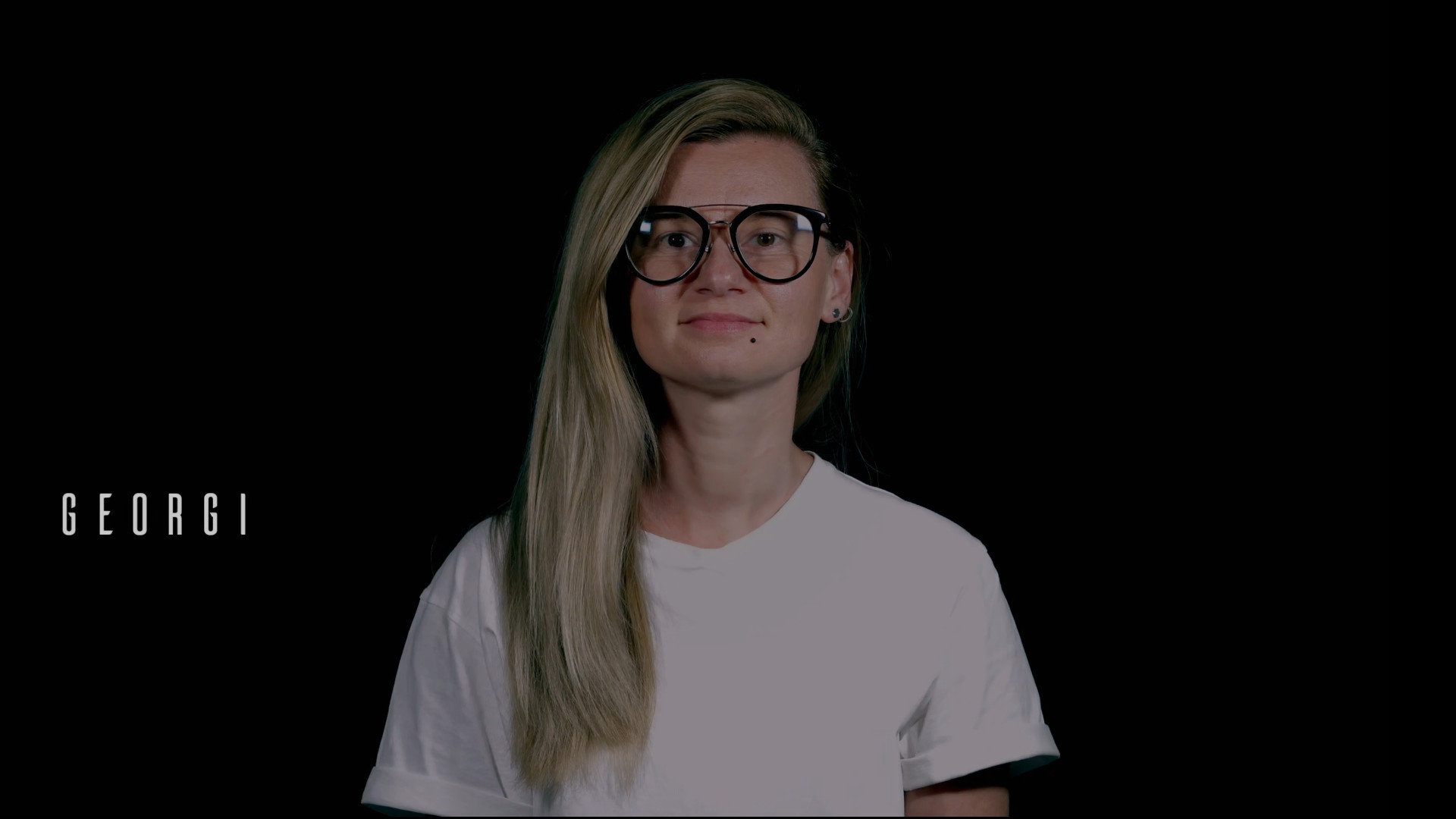 AFTER
AFTER
In the right side you can see the difference between the “dark background” we used, and what it means to have a purely dark background, because I had to reposition each recording into the center of the screen. So you’ll see a “leftover” pure dark band on the right.
Aaron’s recordings were the best, because by the time we filmed him we got better at it. Plus he had a perfect shirt in terms of color. But as you can see I had to make his recording match Georgi’s.
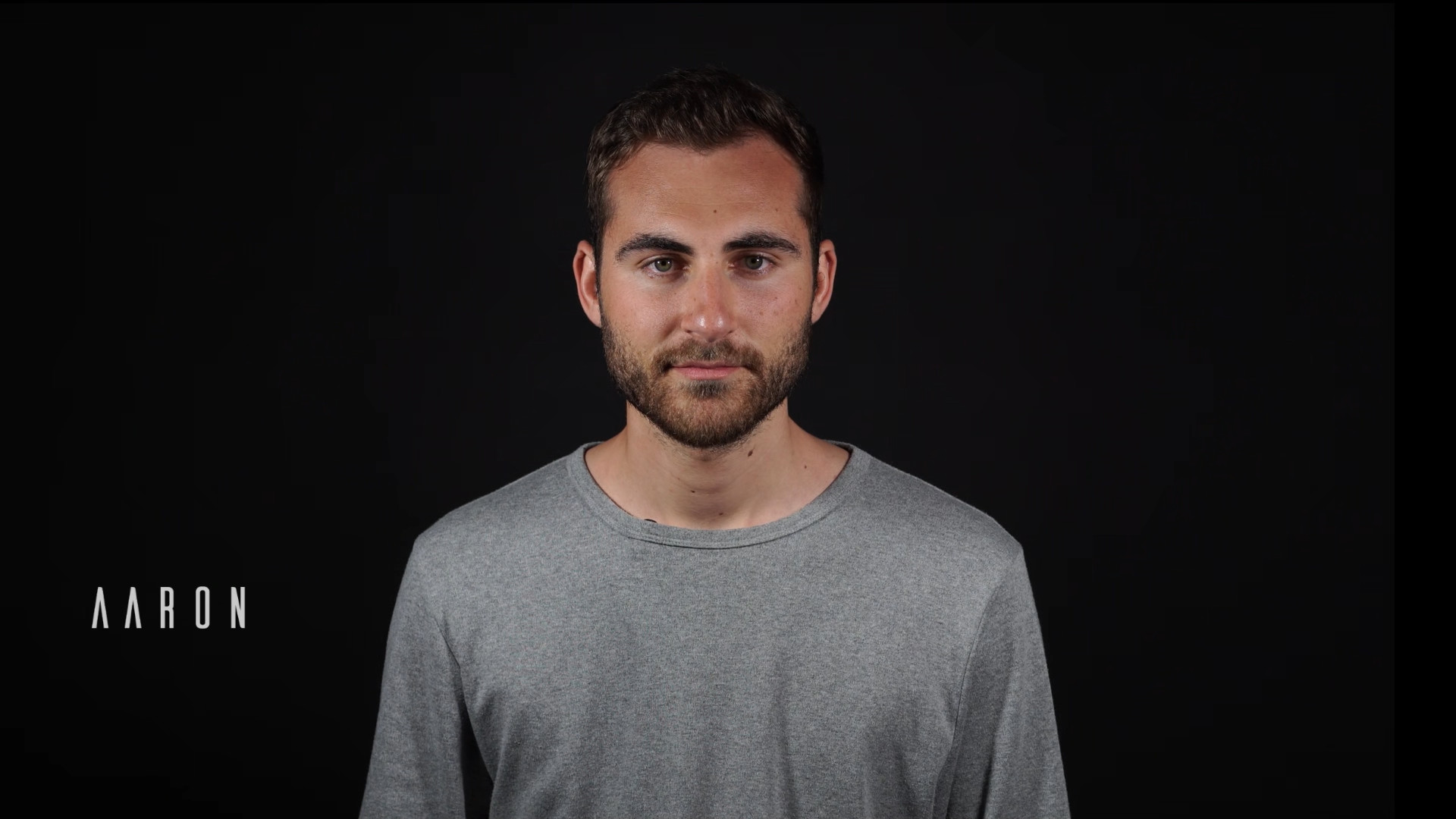 BEFORE
BEFORE
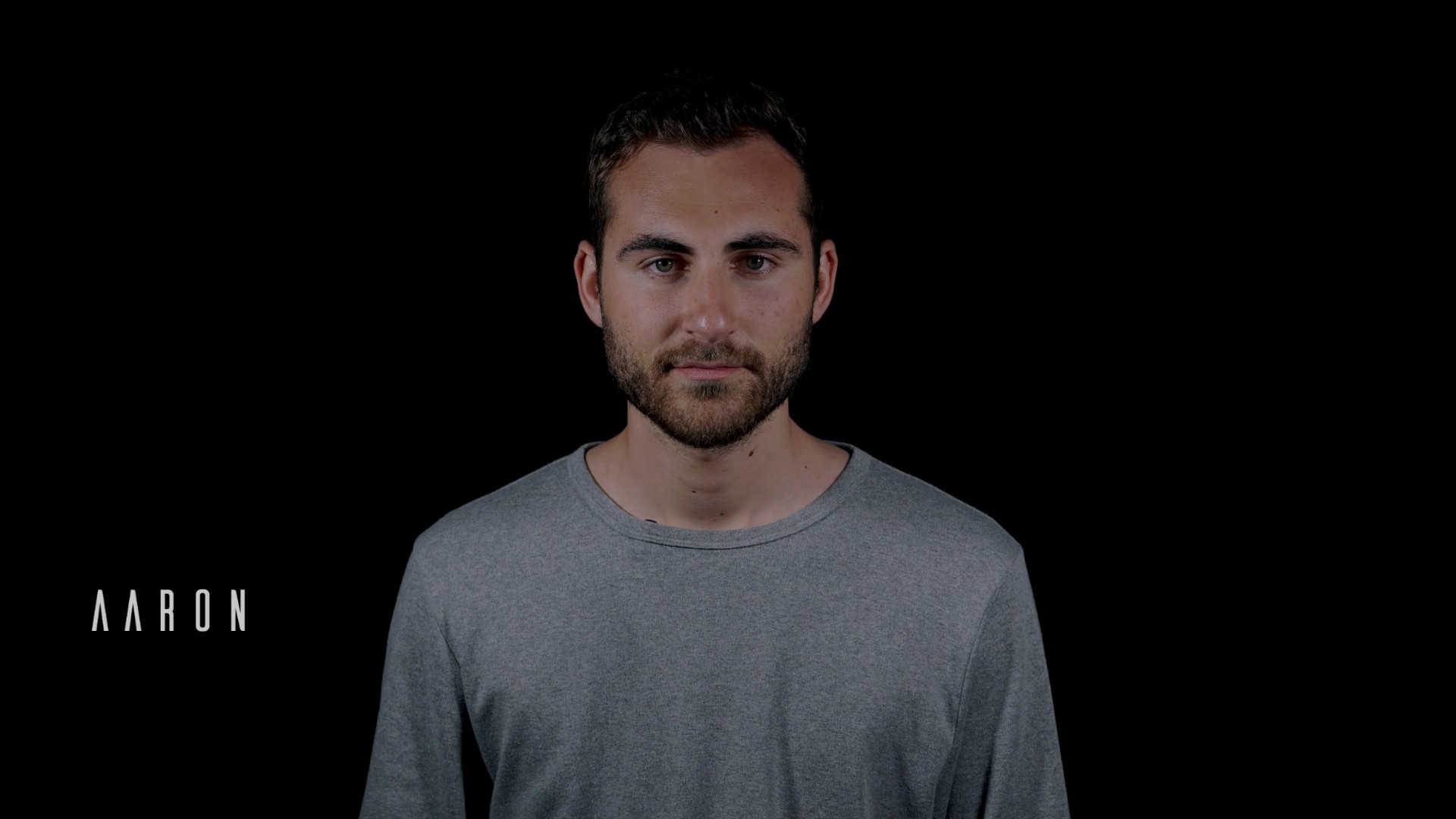 AFTER
AFTER
Sasha’s recording was kinda bad. She looked very pale, and there was a strong tint of blue. That background is for sure dark blue not pitch black. I had to fix a lot for this to look much better, add more reds, lower the blues, the contrast, etc. You can see it is a huge difference.
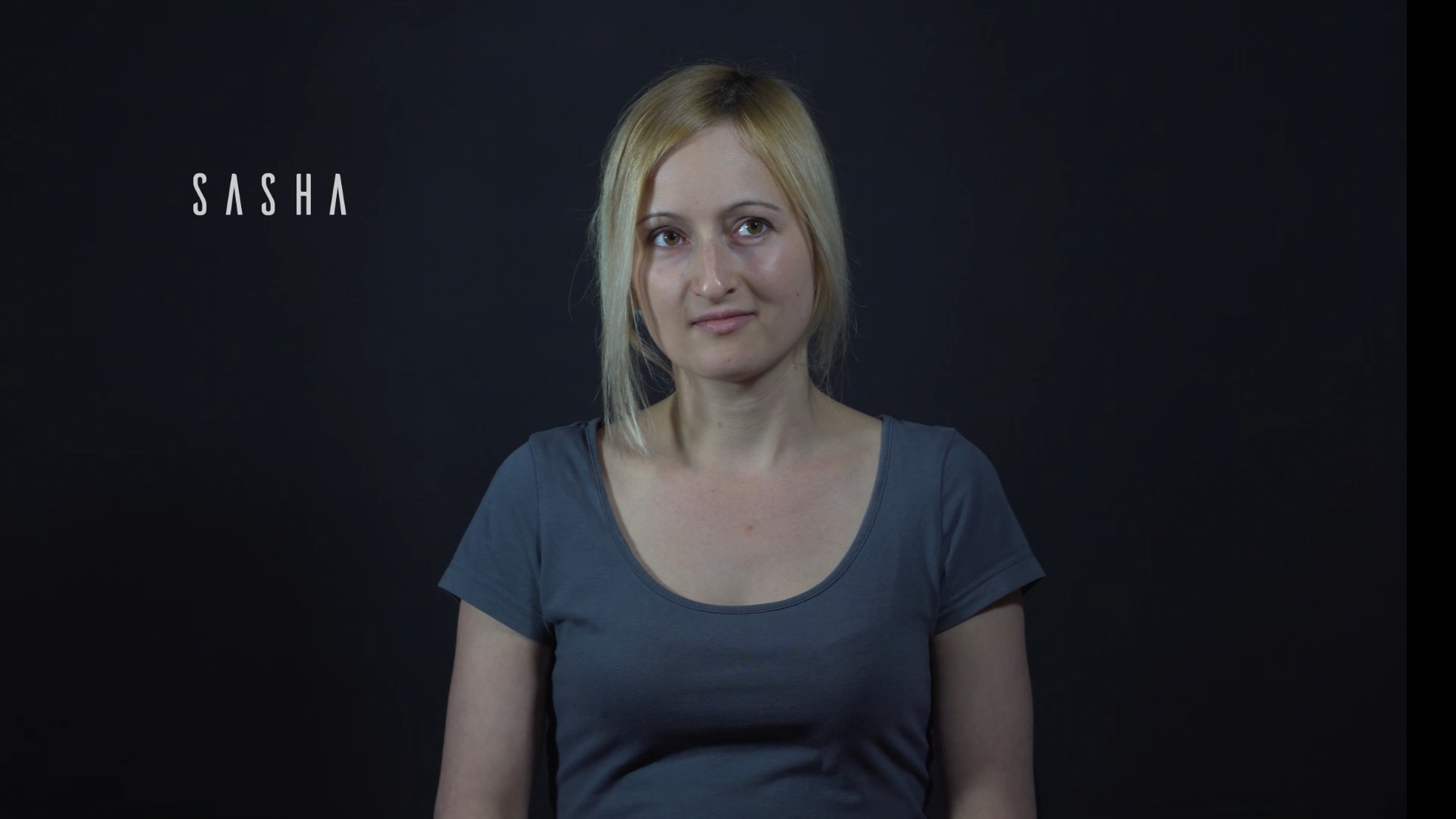 BEFORE
BEFORE
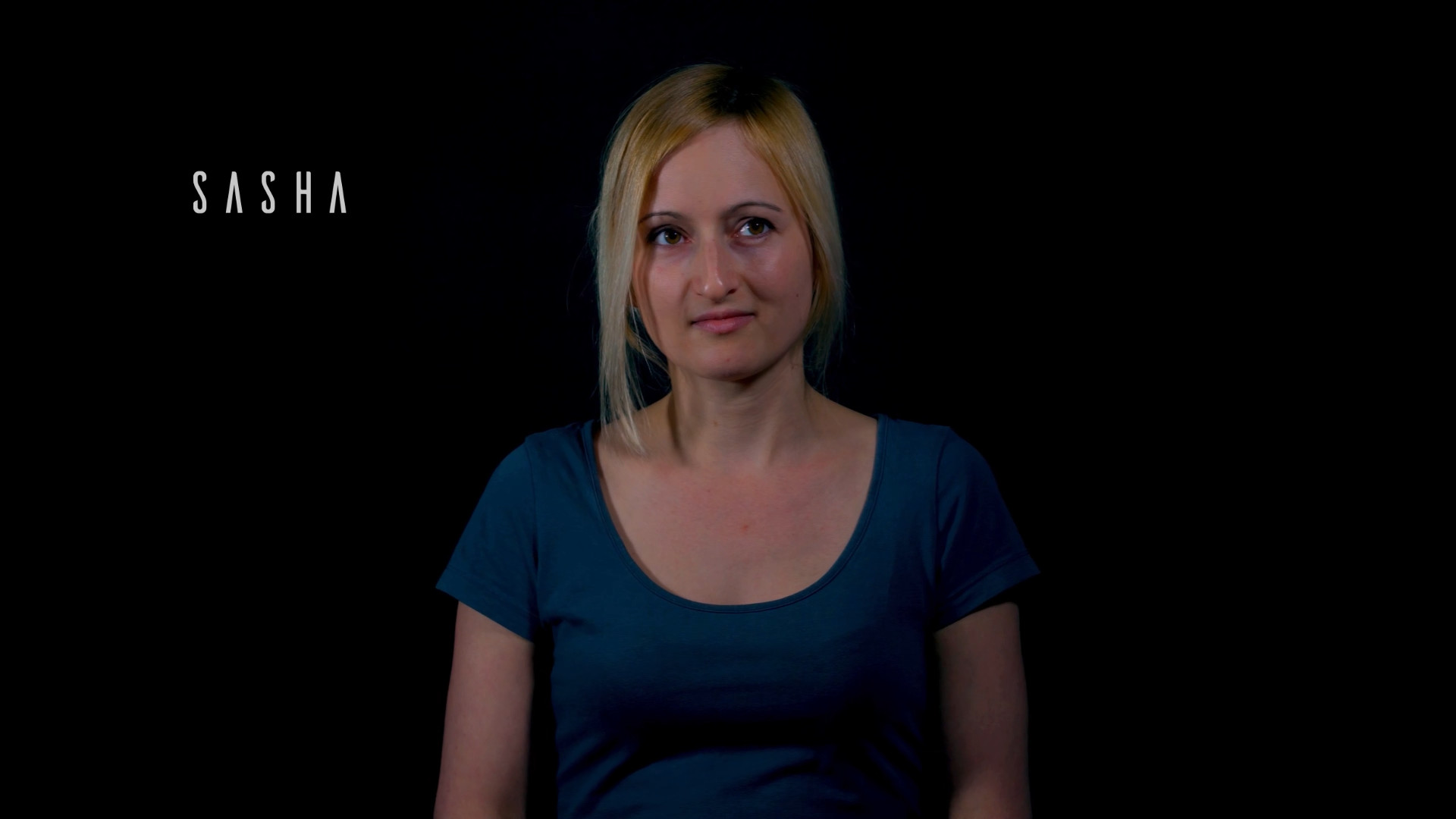 AFTER
AFTER
And after I thought that I am done, I realized that bringing up the reds made Sasha’s beautiful red left cheek so red it was distracting. Sasha naturally gets that redness when she’s excited, stressed, or drunk 🙂 . She was not drunk tho.
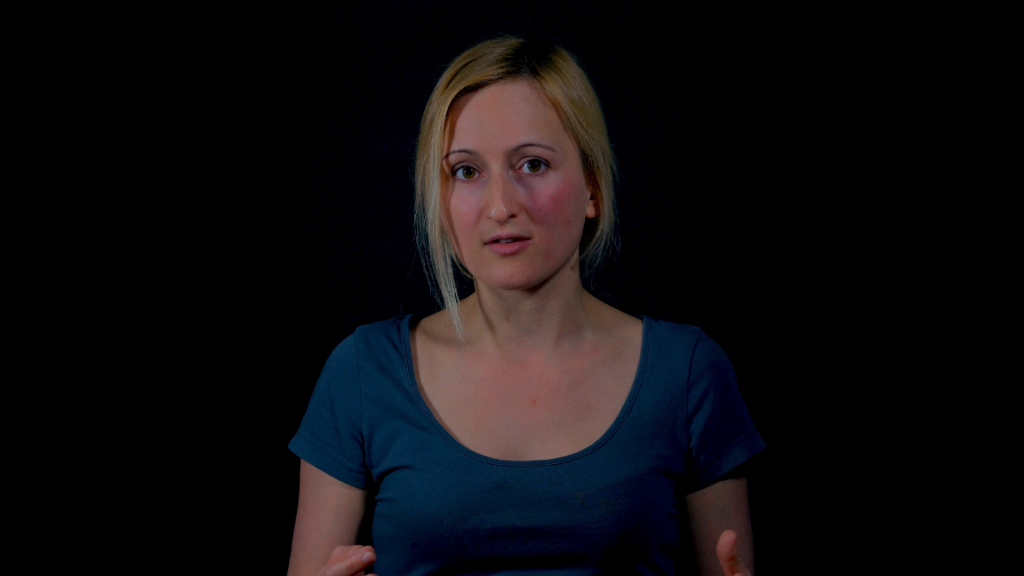
I left it like that because honestly I did not know what to do… Then Dima suggested to track down her cheek and fix it. Sounded like crazy nuts to me, but eventually the result was really great. So I spent days and days, tracking down her cheek and bringing down the redness…if that’s not love then ….
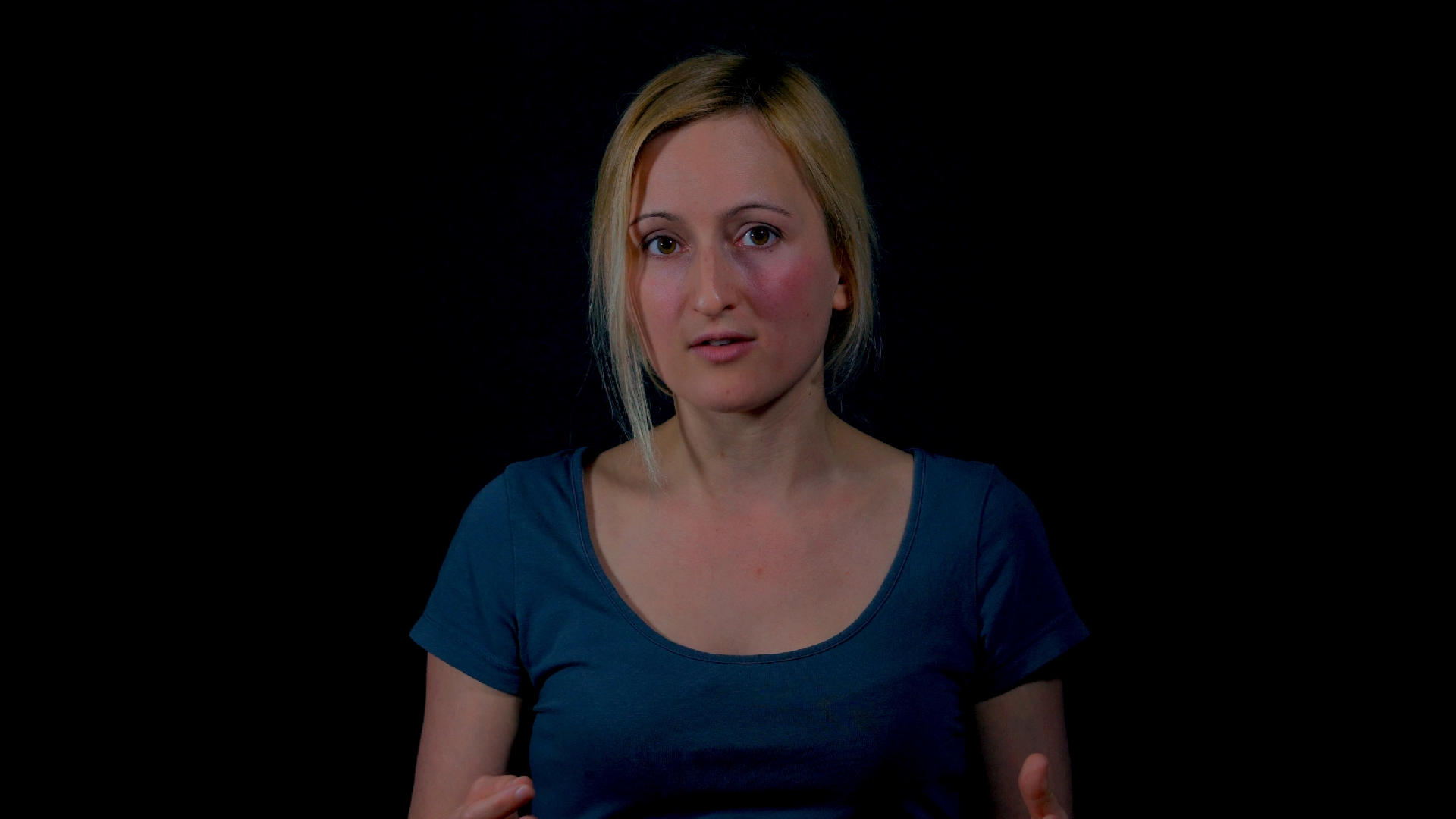 BEFORE
BEFORE
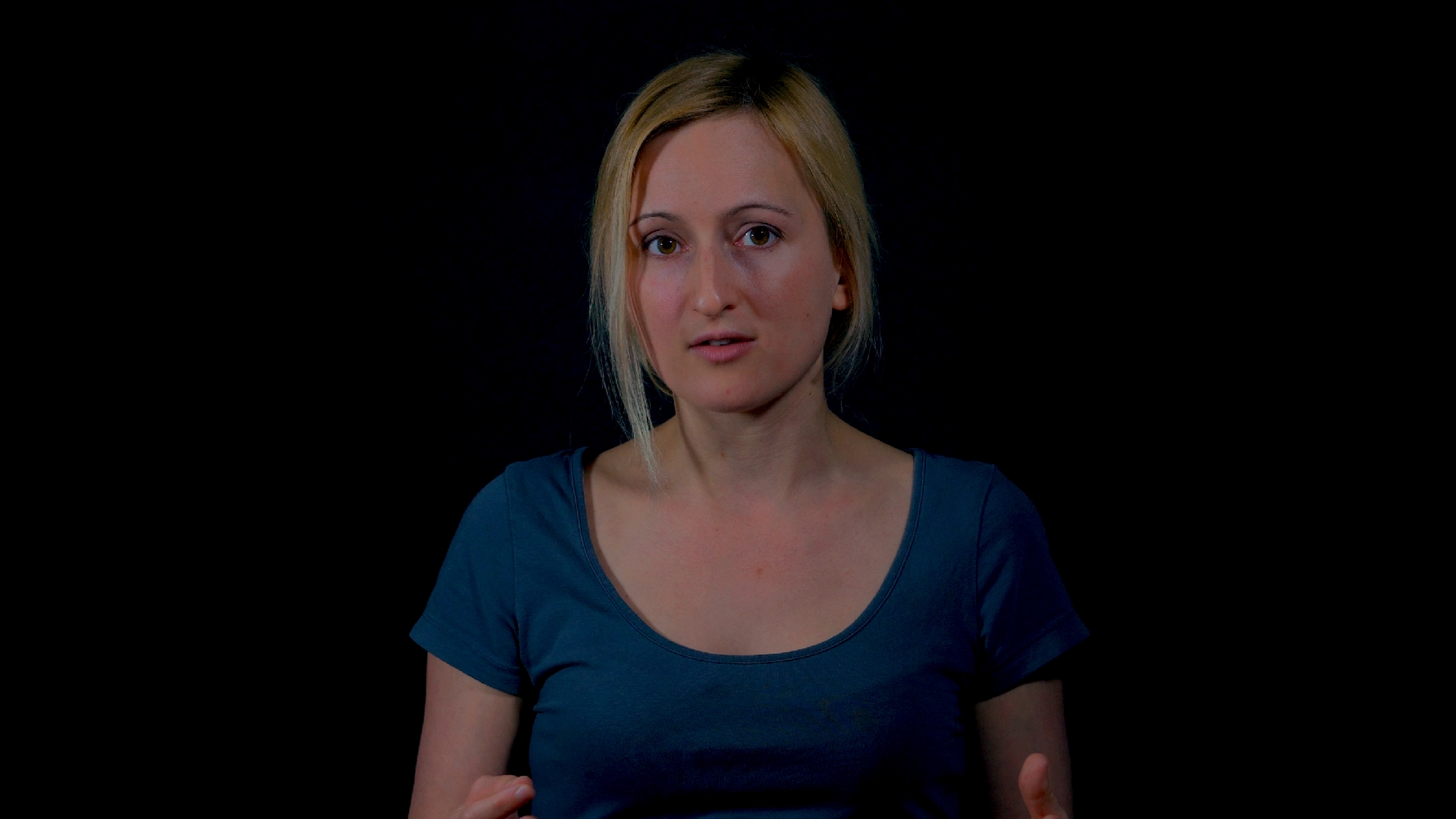 AFTER
AFTER
I added THOUSANDS of keyframes! You have no idea how intensive this task is. And also tuning it down in a way that looks natural.
Did I mention that the colors, luminosity, and position changed for each of our recordings enough to have to fix almost each of these recordings individually? It is not like I could fix a recording with Sasha and voila, copy paste those effects to the rest of her recordings. No. I had to at least tweak them a bit for the rest. At times that was crazy time consuming.
Here’s Dima. Very brightly lit, very brownish.
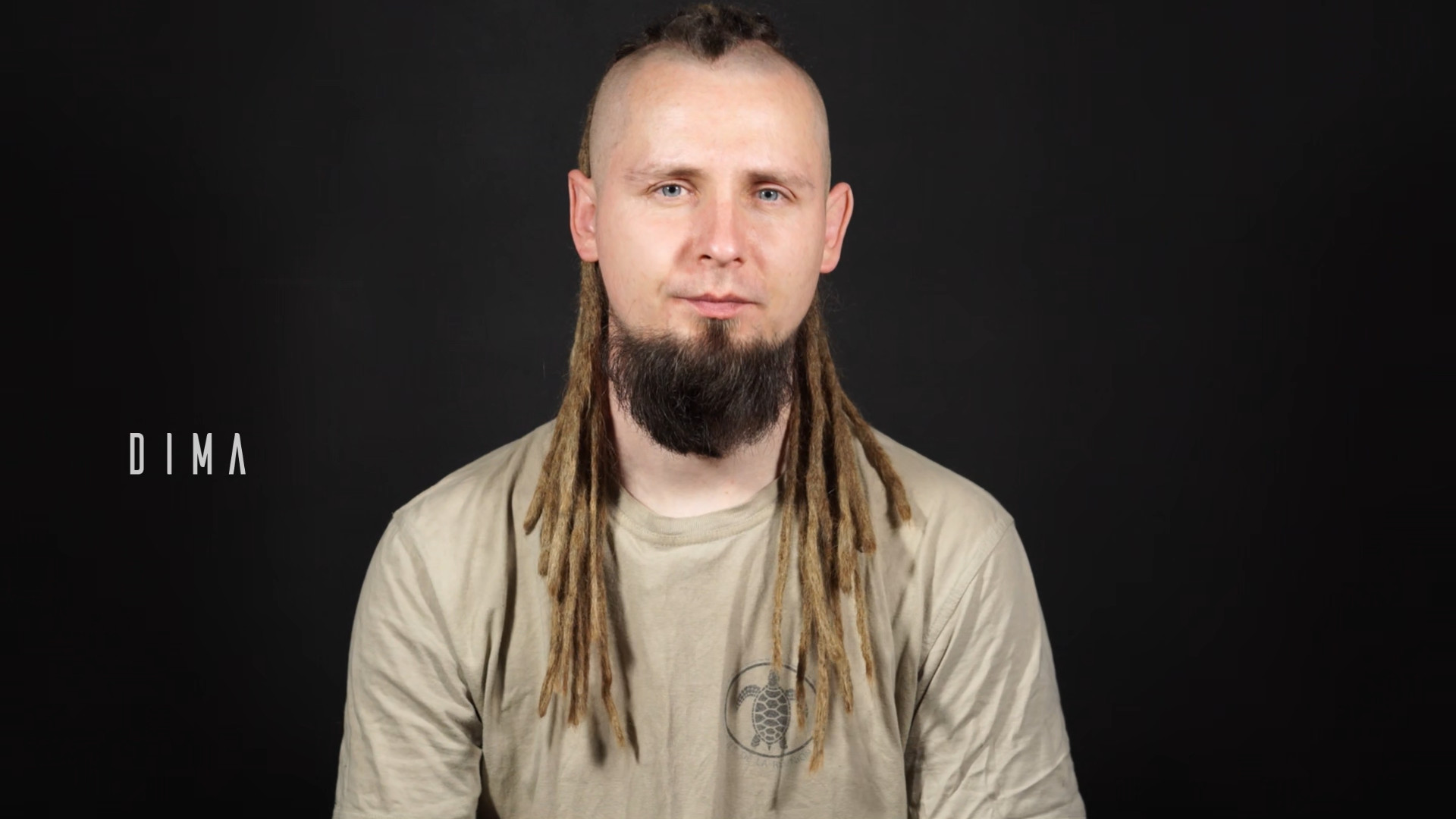 BEFORE
BEFORE
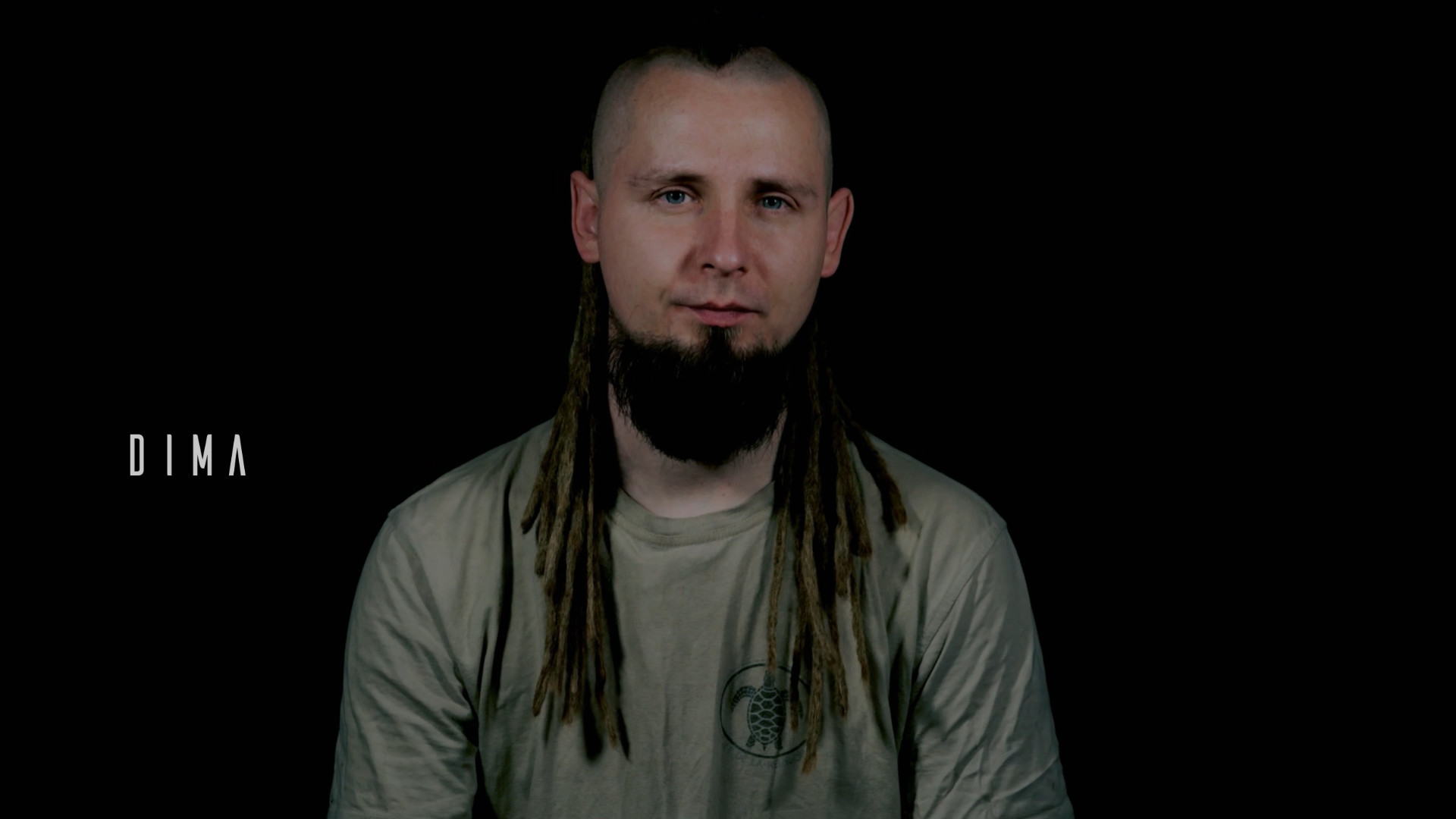 AFTER
AFTER
Again, keep in mind that I wanted us all to look as if we were part of the same recording. I can’t have Dima be brownish, Sasha blueish, Georgi whitish…
And the worst offender….ME!
The idiot decided to wear a dark blue shirt on a dark background…you can even see my shadow on that “pitch black” background….
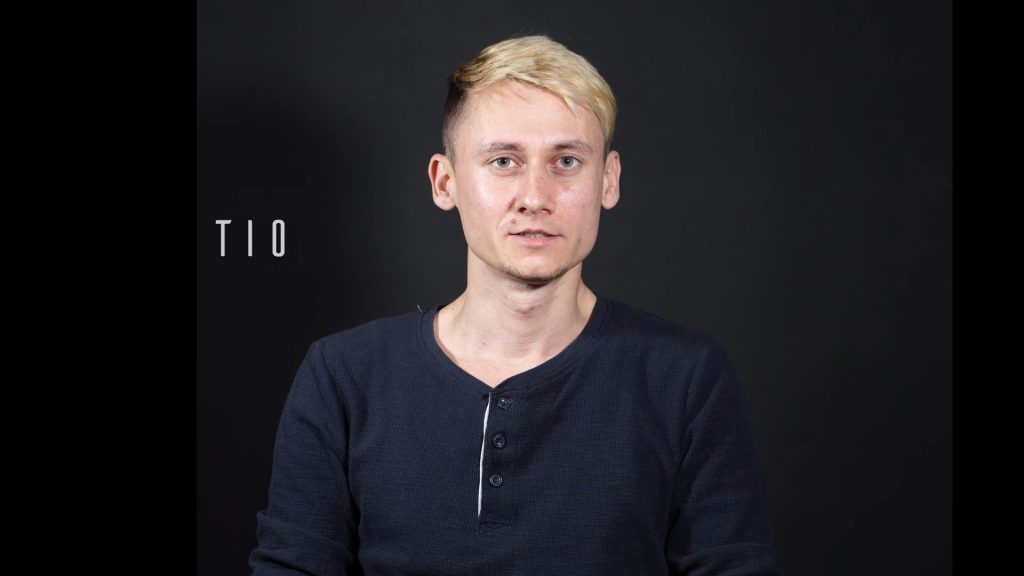
It is NOT easy to make that background dark and not make my shirt invisible. I struggled the most for this one.
I had to remove the background manually. And add so many effects, each tweaked in its own way, but each would affect the one bellow…. so a cascade of changes were happening. So tricky!
In the end I think that I did it good. As good as I could:
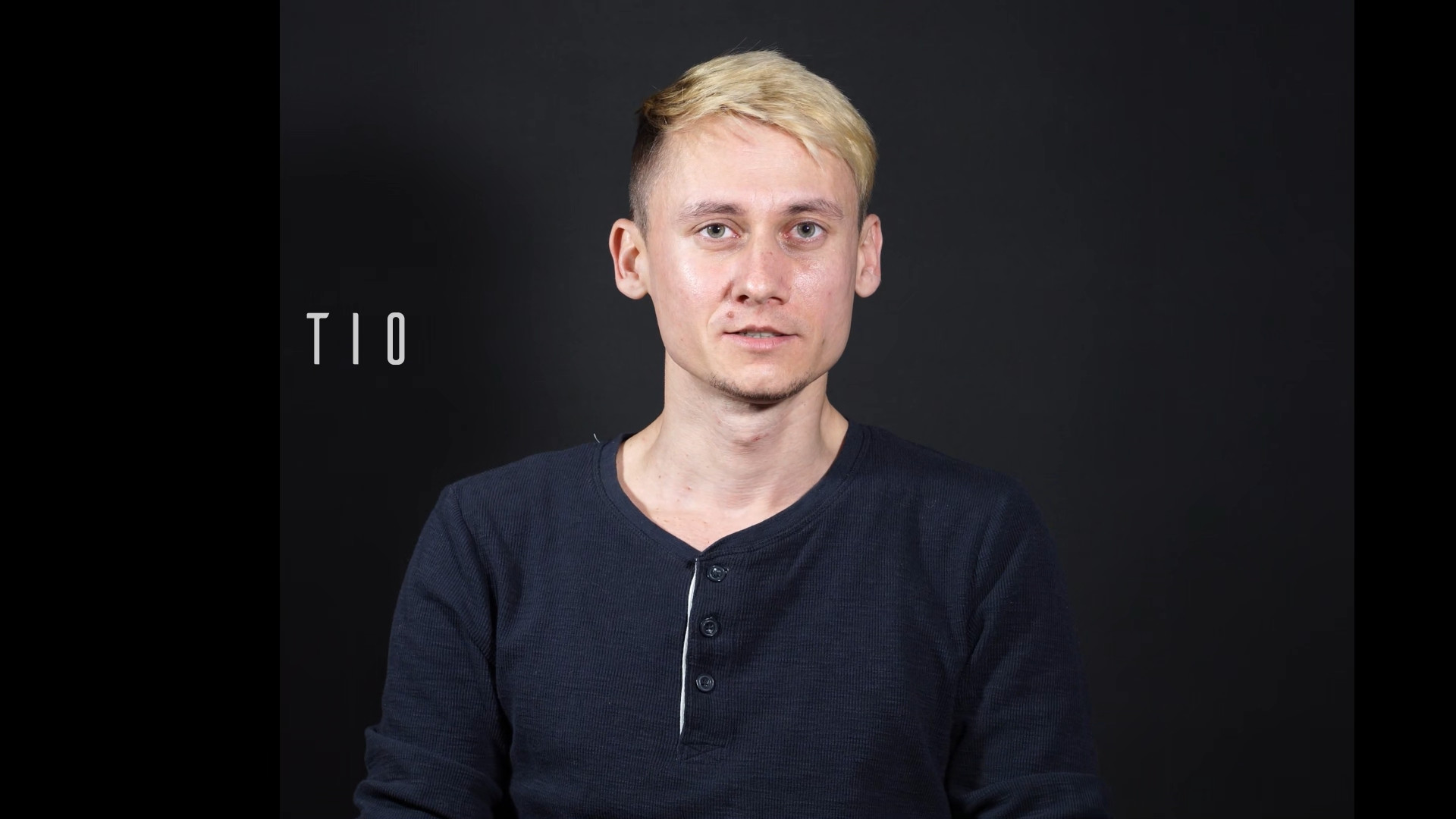 BEFORE
BEFORE
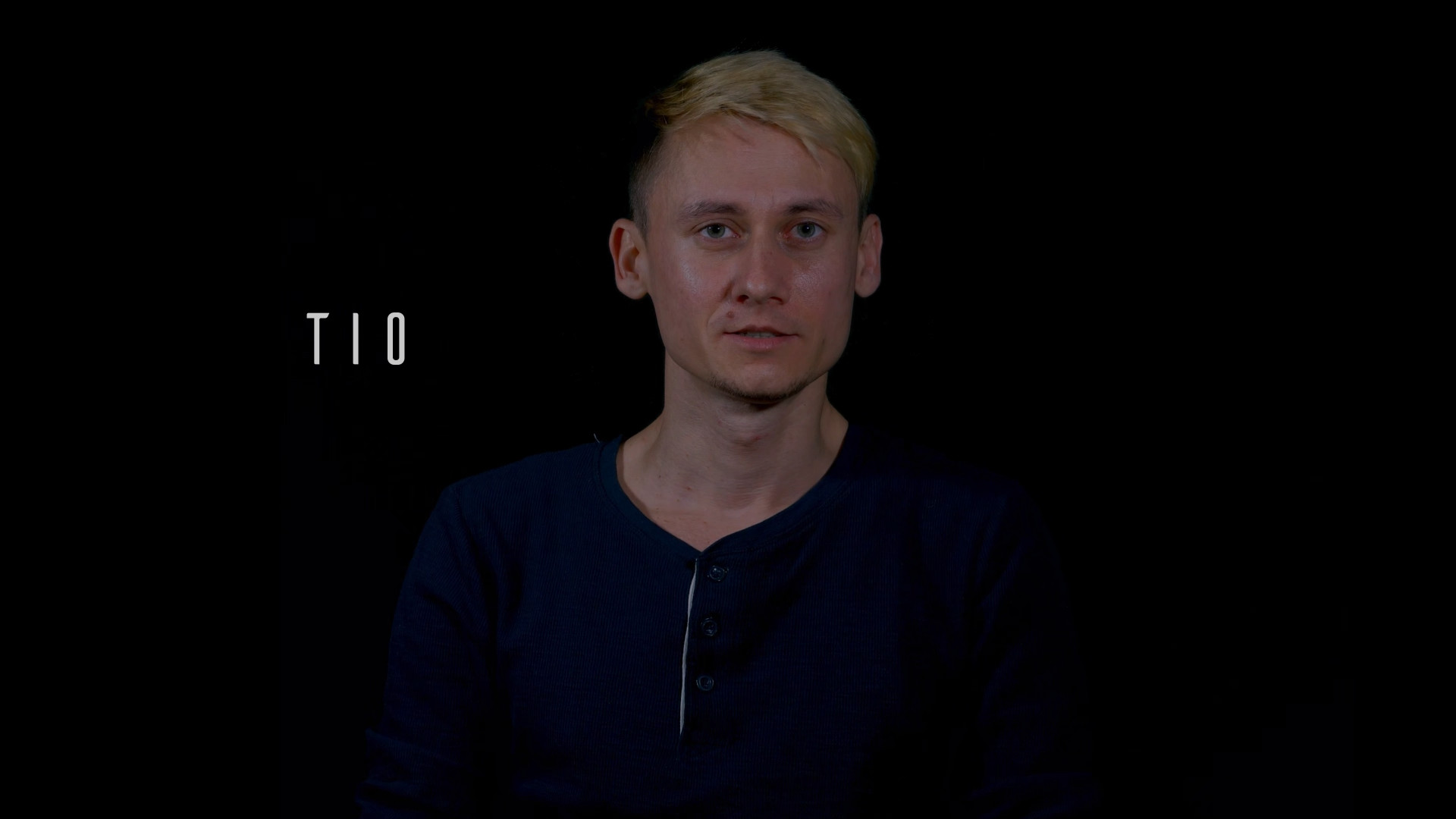 AFTER
AFTER
And if you think I could have made my shirt brighter, trust me I tried, but then you could see artifacts of the background orbiting around me. I worked for weeks on my recordings alone.
The end result.
Here’s how the first part of the documentary, the intro, would have looked like if I would not have color corrected anything:
And here it is with the color correction:
I do not know what LCD/OLED screen you watch this on, but for me the difference is massive. And I had to do this for a 5 hours documentary. So yeah, I am quite happy with the result and the fact that I could do all of these in Kdenlive.
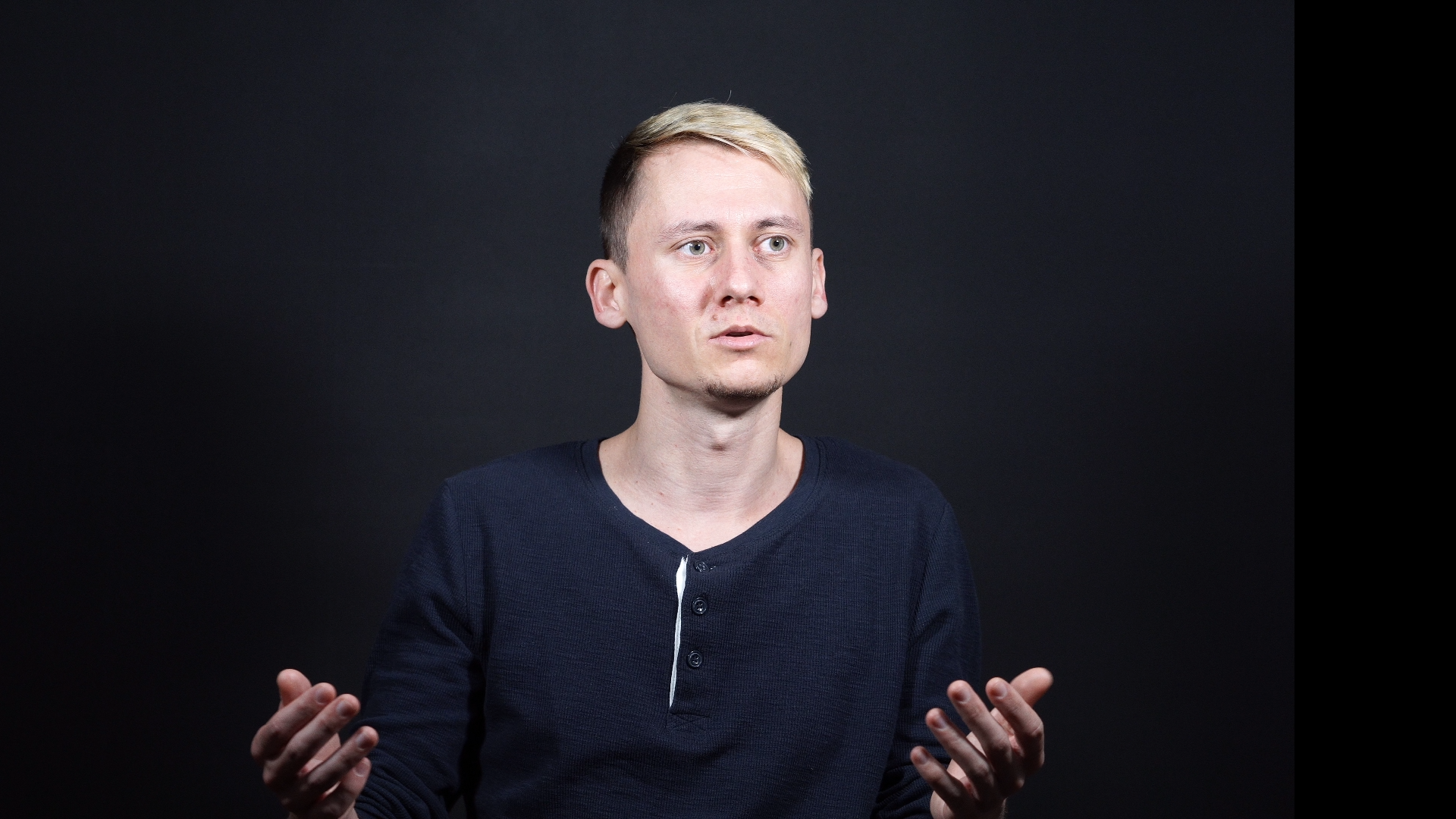 BEFORE
BEFORE
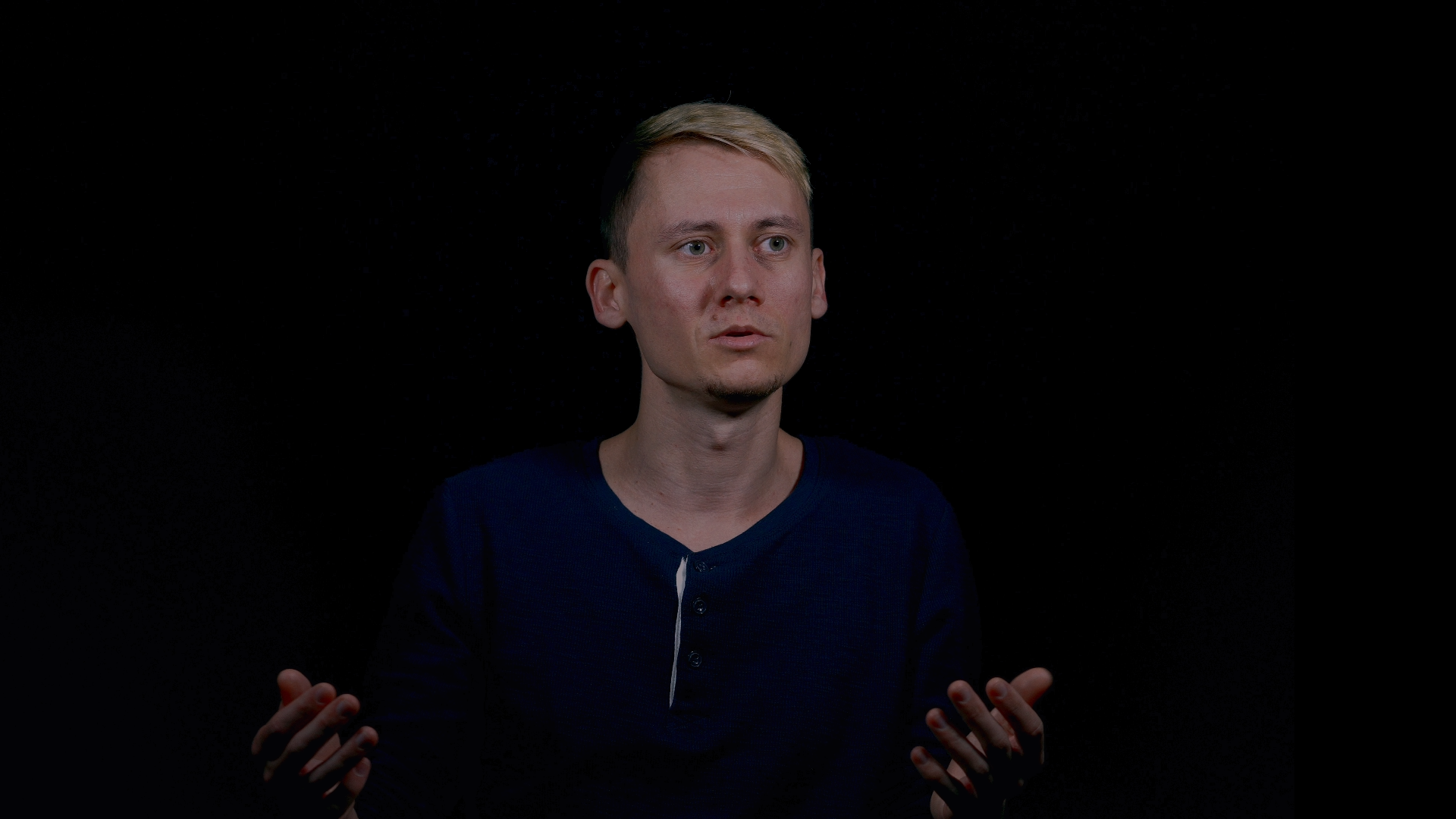 AFTER
AFTER
Footage? From where?
Imagine a compilation with the latest automated robots with a cool background music. Imagine a 20 second compilation with people doing all sort of jobs and being stressed by that. Imagine someone talks about how wonderful the nature is on this planet and you can see some mountains, oceans, creatures…. Imagine!
Well now go ahead and make such compilations. And do not use bullshit and fake stock footage that looks weird and soulless. It is DIFFICULT.
For example here I wanted to showcase the movies that were most influential for us growing up in the 90s:
5 minutes. Took me some 2 weeks to finis that. Simply because I needed to find bits and pieces that were relevant and at times similar with each other to flow well one after the other. The kicks and kisses and all of that, had to make some sense one after the other.
Or in the second part where I wanted to showcase the entire human history in a minute and a half. From Monkeys to Money:
I had to find the proper footage and took me several documentaries to do so. Or when I showcased how automation can replace human labor and had to spend a week or more going through some 20GB of video files to find the right ones:
And so on…I hope you get it. It is easy to imagine things, but when editing even the “searching for footage” part is incredibly difficult. Not to mention to put them together.
Speaking of that: REAL FOOTAGE!
When you see a kid crying, mountains of waste, some poor people, or people working, and so on, all of these are REAL footage from real events and situations. Not some bullshit fake kid crying on storyblocks.com for $4.99 per download. It was so difficult to go through hundreds of documentaries and perhaps thousands of videos to grab the right footage. Luckily I love documentaries and I have seen thousands so far and gathered the best on VideoNeat.com so I knew where to find what. So many times I had to import a 1h documentary in Kdenlive just to grab a 2 seconds footage.
For example here, you see some people pointing at some galaxies….well these are the scientists behind the WEBB telescope looking at the images taken by the telescope:
And so goes for the rest of the footage from that part, those are real scientists….
I hope that you, the viewer, appreciate the fact that what you see is real.
This is how the documentary looked like in Kdenlive (I did not have enough vertical space to fit all of the layers):
The sounds!
To deal with the background music for a 5 hours documentary is no easy task. In my view the music for a documentary should either not be noticeable (so it won’t bother you but without it would be quite “empty”); or enhance the narrative – so to emphasize some events or whatever people say, or what you see on the screen. Therefore if you do the music badly, you can ruin the documentary. Can feel out of place.
For the first TROM documentary I simply used the same music for 70% of the documentary, the Monetary System part. The rest were a few songs that played in a loop. For this documentary I put a ton of effort into the background music. Try to see the “From Monkeys to Money” part without the music. It is empty.
To my great surprise everyone so far loved what I did with the music. And that’s fantastic because, usually, you don’t want people to complain about the music. But when you get compliments I think you did it very well!
I was very much influenced by the BBC documentaries like Seven Worlds One Planet, or Blue Planet II, and the like, that use fantastic soundtracks composed by fantastic composers. They make everything more interesting. And so I also added sound effects, and quite a lot of them. For transitions, for effects, at times for footage like animal sounds, nature sounds, or whatever made sense. Sound is so important for video, and I realized it so much more when working on this documentary. This is my first “sound editing” endeavour, so I hope I did it well.
The Land of Confusion
I wanted to use a really good song as the theme for this documentary. I even wanted to write some lyrics and work with Dima and Mara to make an original song. But that would have been mighty difficult. I also wanted a song that is not super popular, but has some very good messages in it. I searches for months probably, until I came across a silly made music video that had some great lyrics. And I never ever heard that song before, so that was a fabulous find. The song is called Land of Confusion by Genesis:
But I didn’t feel like it was powerful enough, sounded a bit techno to me. I then searched for many many remixes and found one that was not very popular at all. And I fell in love with it (Pilotpriest Rework):
I think this song it PERFECT for TROM II. I love it! And it seems that everyone loves it so far. I will remember this song for a long long time….
Kdenlive
So often you hear that Open Source software which is also free, is not on par with the pro-paid software. It is nice, but meh. Not for the pro-bros. I use Linux (TROMjaro) for many years now and I do a ton of stuff. It is super stable and wonderful. I used LibreOffice to write massive books and even design them. People loved these books. And now I used Kdenlive to make a 5 hours documentary. What more proof do we need to accept that yes, Open Source software that is also free (so trade-free software) is good enough to make pretty much anything with it.
After 2-3 years of constant work with Kdenlive I can say the following about it:
1. Pretty stable, but…
On Windows you usually install a piece of software and let it rot. Updates? What are those? In a way that can give you a false sense of “stability” simply because the system or apps is/are not being updated. But on Linux everything gets updated quite often, especially for a rolling release. So if you plan to work for a few years with the same video editor, then these updates may break things. And they do. So the best option is to either opt out of updating the video editor (which can be done in TROMjaro for example) or simply download the Appimage of the program. I LOVE Appimages. They are ONE single file that contains the entire video editor. Else, for those who do not understand the concept, the video editor would depend on other pieces of software. And if those pieces of software get updated but not the video editor because you chose so, then the video editor can get fucked.
Anyway with Appimages you get the entire video editor in one file that is not modified. And thus you can forever work with that, locking Kdenlive on one release. And so I did it. But after a few months of work I would download a new Appimage and migrate to it.
Basically if you want to work with Kdenlive for such a massive project, Appimages are the way to go.
Kdenlive still has some bugs, but considering how much I threw at it, it was damn stable. Plus it auto backups your projects almost every minute, therefore even if it crashes you can easily restore your project when you open it the next time.
Appimages + Auto Backups for projects = very stable and reliable.
BUT!
That being said look at this red and dark face that is misaligned:
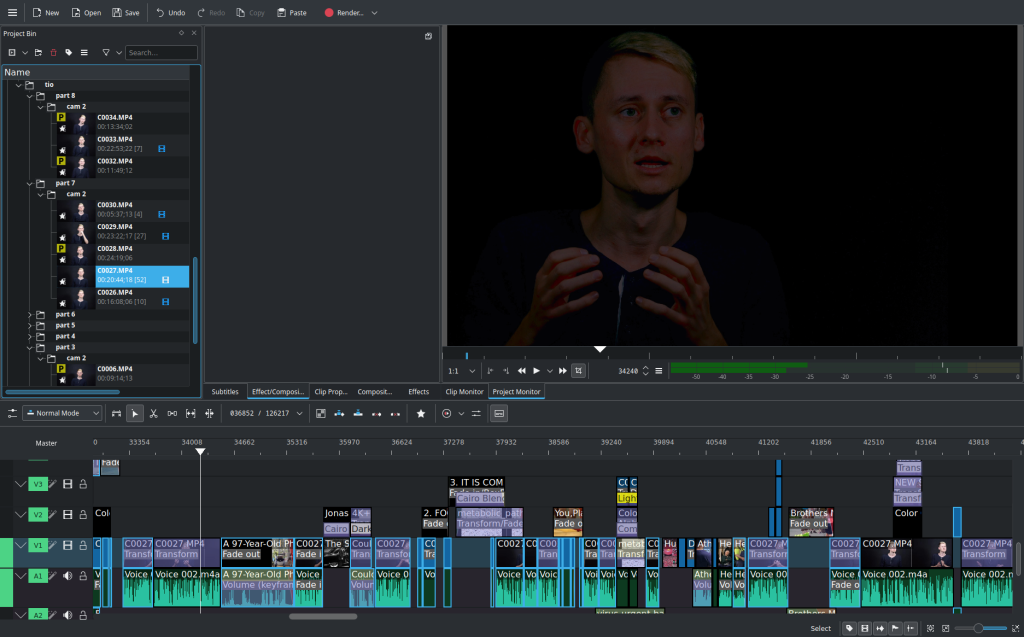
Despite using Appimages, I came across a bug that it is still present today and it is hard to replicate, but made me almost want to give up Kdenlive. Imagine this: in a project I had some 40-50 main clips with me. For the first year of editing I cut hundreds if not thousands of little bits out of these clips. All in Kdenlive. These little bits were added to 4 separate Kdenlive projects, scattered across 5 hours. So, TONS of little clips with me scattered through 4 huge Kdenlive projects.
So.
Now I do the color editing for say 1 of those 40-50 main clips with me. Imagine this 1 clip is called C001. C001 is 30 minutes long. Out of it I cropped some 100 clips and added to the Kdenlive timeline for project number 1. When I color correct the C001 clip all of the 100 bits in the project should be color corrected as well since they belong to the color corrected C001.
And so I did. Weeks of work. Rendered the video and….voila: I looked red, or dark, or weird, or out of place, yet the rest of the video looked good. I check the project and 50% of the 100 clips that I cut from C001 were messed up in the timeline. The only way to fix was to try and move them to a different layer….and where there was no space for one…good luck!
Imagine color correcting ONE single main video, then manually check the entire timeline of say 100 clips, then fix the ones that were messed up. Multiply that by the other main videos that were with me, then the rest of the ones with Sasha, Georgi, Dima and Aaron. Not only that but say you fixed them all, and you are happy, but see that a particular main clip with Georgi needs a bit of color fixing. It is the C023 clip. I fix it, then go again and check the timeline to make sure Georgi does not look like a monster.
It was INSANE. I had to always check the timeline. And then I would become paranoid and would not trust the final render, so I would have to rewatch the ENTIRE documentary after every render….and I rendered it many many many times. It felt like a torture.
This was a very odd bug and hard to replicate because it seems that you have to add a lot of effects in some particular ways to trigger it. But if I wasn’t passionate about these trade-free things, I would have gave up Kdenlive because of this since it was becoming impossible for me to do color correcting.
2. Pretty capable, but…
I will not go into details but trust me you can do a lot with Kdenlive. Except for some photo slideshows that look 3D that I’ve created with paid software for the lack of time, everything else was made in Kdenlive. Animations (sorta), text effects, transitions, and so forth. For example this part I made entirely in Kdenlive:
The way things move, and transition, and all that. Took me around 3 hours to make it. May not seem impressive but the fact that you can do these it means you can get creative and do lots more.
BUT!
The text tool is kinda primitive, the effects are just some names in a list and you can’t preview any.
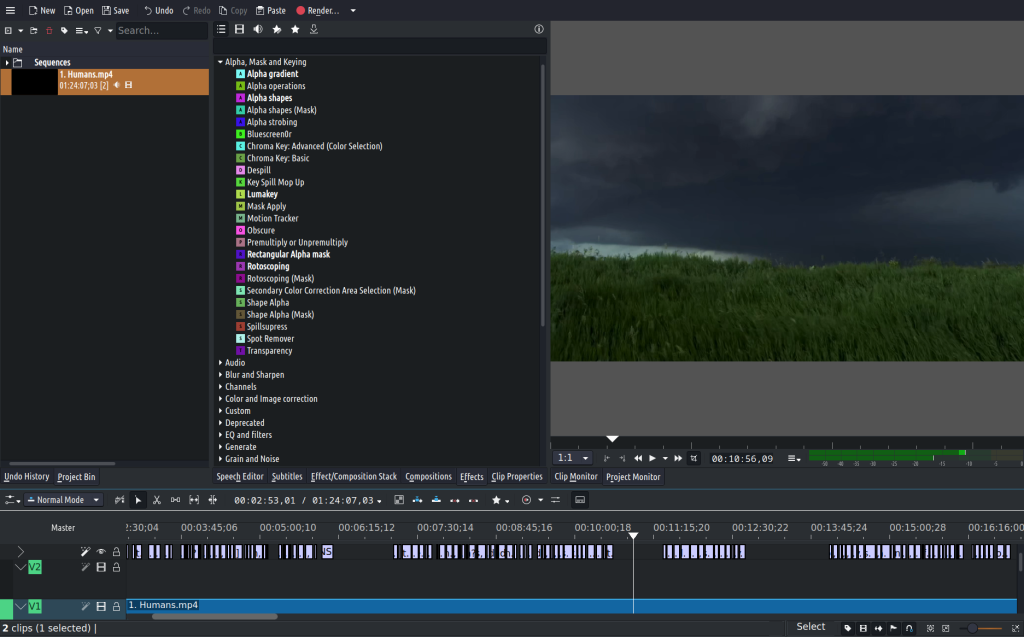
The transitions are also weird…. Kdenlive MUST improve and become more user friendly.
The worst is that you cannot use the video card. Imagine using a video editor but unable to make use of your video card….this is insane. It is like you have an electric bike but the engine does not work. Now go ahead and climb a steep hill. That’s how Kdenlive is. Super slow to render and preview. I felt like back in 2011 when I was making the first TROM documentary on a computer that had a 128MB video memory card and 1GB of RAM. This is BY FAR the main reason why someone may not want to use Kdenlive.
However they implemented many cool features, like proxy clips and the ability to render certain parts of the video in the timeline for preview. So with the proxy clips the editing was super smooth, but bad quality.
Overall.
I love Kdenlive and I now know how to use its potential. There are lots of neat features and when you learn how to combine transitions and effects you can do some really cool shit. Last thing I’ll mention is that we could do auto transcriptions with Kdenlive, and that helped a fuck ton. And it used my GPU for the process. Basically it can transform the audio into text (subtitles).
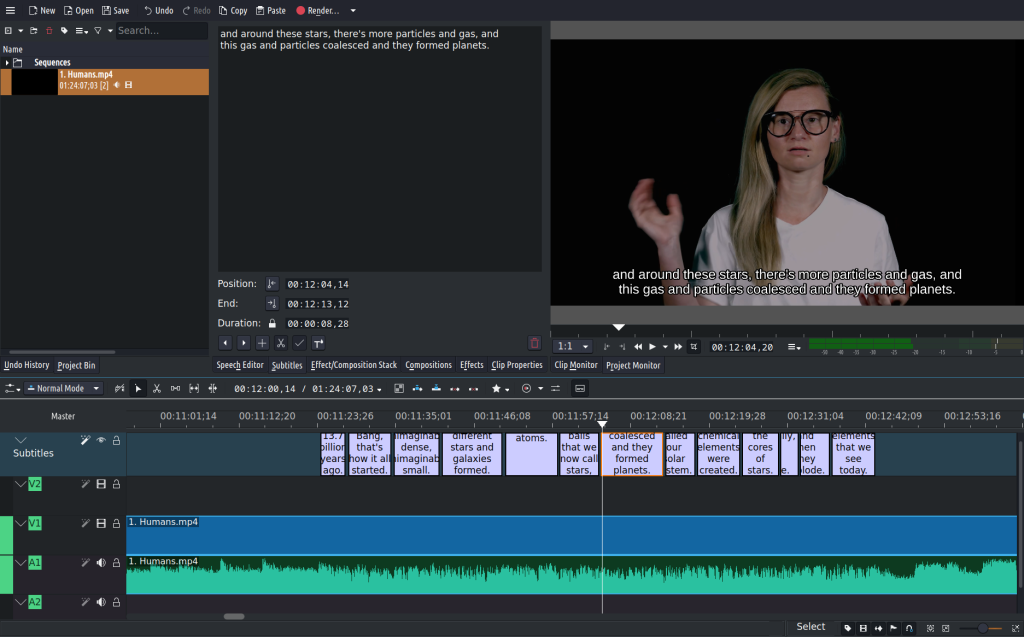
I would say it was 95% accurate perhaps. Which is fabulous. Sasha, me and Roko worked a lot to perfect the english caption, but without the auto-caption made by Kdenlive, it would have been 100 times worse. And editing the subtitles in Kdenlive was super user friendly.
I want to dedicate a moment of silence to Sasha. Or a moment of joy. And respect. Because that girl worked so much on the captions, to make them perfect. She did a fabulous job. It is mainly thanks to her that we have english caption for the entirety of this monster documentary :).
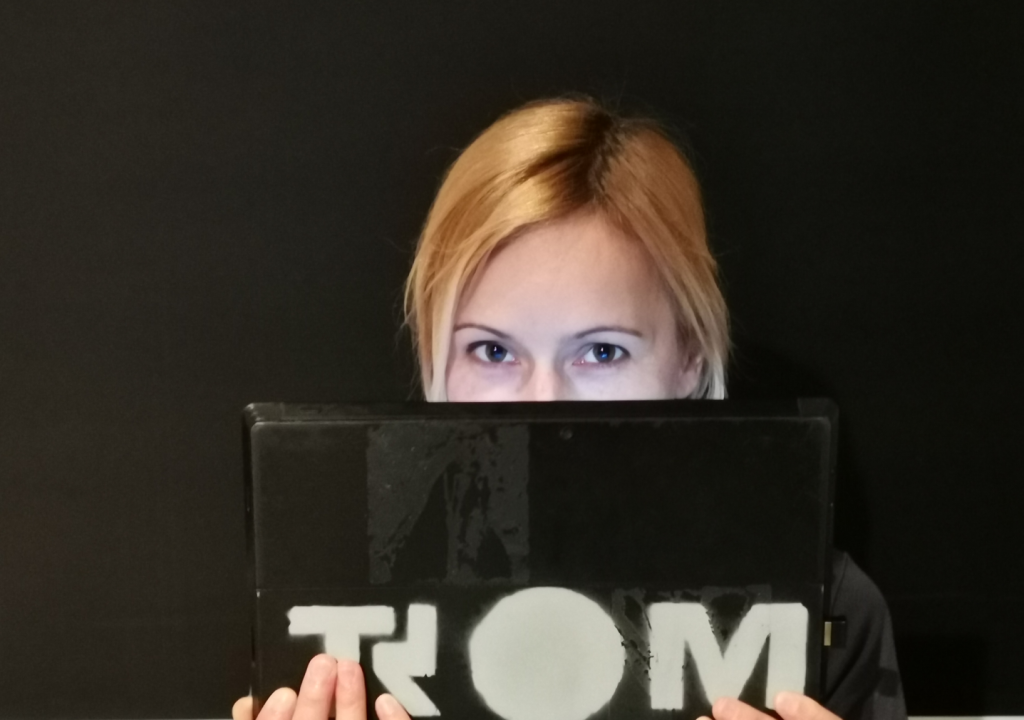
And I want to say that I feel so proud to have used Kdenlive. The people behind this project are doing a fantastic job with 0.0001% of the resources that they would need for such a project. They always improve, add features, and kill the bugs. I am closely following the development.
Final thoughts.
Because I worked so much on this documentary all I wanted is to release it. I had no expectations more than seeing it out there. But despite that I am unpleasantly surprised by the silence of the release. I contacted a bunch of people and organizations, Including The Zeitgeist Movement, The Moneyless Society, or Peter Joseph. No one replied. No one shared the documentary. I am so happy that I first released it privately for a few friends and they gave us a lot of feedback, else would have felt even more strange.
It is ok.
At the end of the day what we talk about in TROM II is real. And fucking important. Objectively so. Therefore if not many people watch it, then there isn’t much I can do. It is a shame since I put a lot of effort to make it more genuine, realistic, not too positive, not too negative. To stir some nostalgia through our life stories, to make people empathize more with the suffering and destruction that is happening; to introduce new ideas slowly, bit by bit, so by the end of it they could accept that a change is not only needed, but possible.
I crafted it for 2-3 years, but I am afraid that the humans of today are too distracted by so much idiotic content to be curious about reality overall. And even if some will watch it, most are too busy living and consuming, so they’ll scroll to the next thing. A war, a fight, a funny kid, a bright light….a UFO? Conspiracy! And lunacy!
Tiktok, Netflix, Spotify, Twitter drama…endless Youtube nonsense. Who the fuck cares?
Call me an old grumpy man, but I think that people are becoming more and more idiotic. In a way, if this documentary would be super popular it would not make sense. I would feel like I was wrong about how I this society is. So it being very unpopular proves that what we talked about in the documentary is true.
Anyway, it is a reason why I called this documentary “A Message to the Aliens”. Because I feel like no one here listens anymore.
Contrasting with that, my feelings for the people who gravitate around TROM are positively intensifying. I like them a lot.
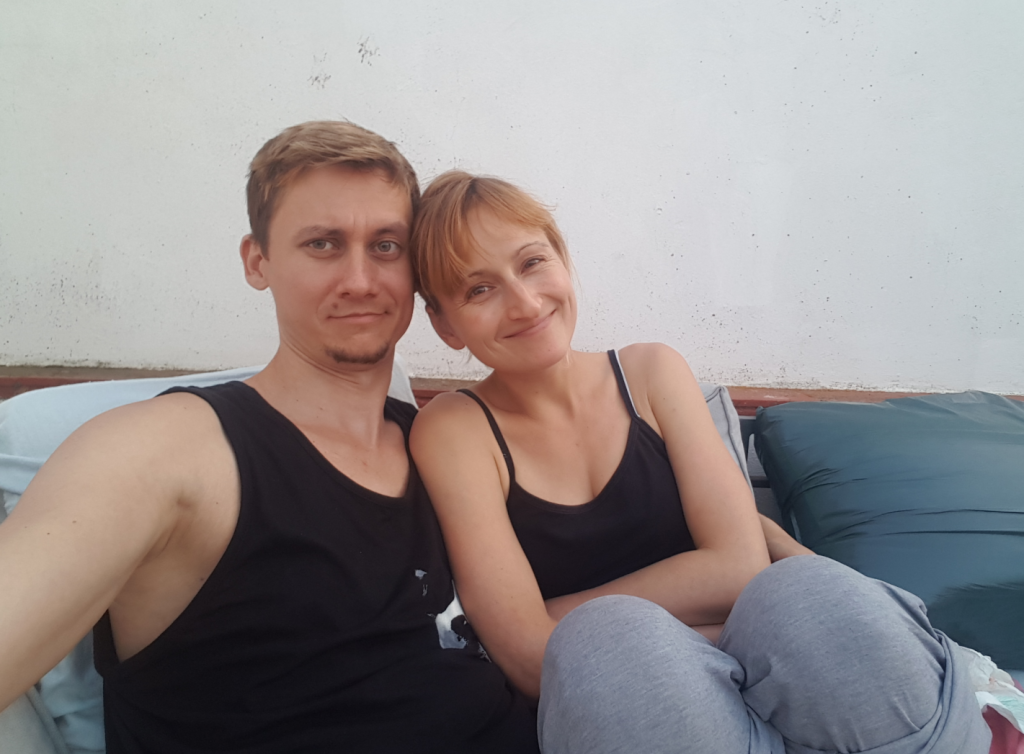
Georgi is furiously and passionately working on a Romanian translation for the documentary. She wants to push it more. And she loves doing the translations. Sasha talks to everyone she knows about the documentary despite working a lot to make some money. Roko is doing a marathon screening of the documentary for his family. Roma works like a tank to make the Russian translations. Alexio, Aaron, Airton, Roma and a few more help with the translations, spreading the word and so on.
And I will continue to swim against the current, because I think that the current leads us to idiocracy and destruction. And it is hard, and you feel like not moving forward, but I am happy to be one of those who fights. To have the guts to continue despite the push against whatever I do. And if very few will watch this documentary, at least it is there and I am so happy about how it turned out to be. I think it is a unique one, and it still gives me goosebumps when I watch parts of it.
We do. Do you?
